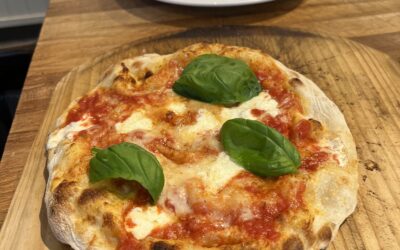Not too long ago, I first started noticing hits from La Memoria de pan, Te quedas cenar and El foro de pan. All coming from Spain, so I wondered who was behind all this wonderful bread blogging. Shortly after I became a member of El foro de pan, which by chance is also visited by no other then Dieter Buschmann and Dan Lepard.
The creative and talented baker behind it was Ibán Yarza and I had no clue who he was? It was then I started finding out about this bread revivalist, cyclist, fermentationist. Along with Javier Marca and others in the bread baking renaissance in Spain. A self taught baker,he is teaching at home and wherever he is needed, from Bilbao to Barcelona. Ibán can be found with kilo's of flour on his bike and sanwiches in hand, but most often he his folding dough. Passing on the message of good bread with passion. On his various blogs regarding food or bread you can see his dedication and appreciation for good things, bon vivant au bici! I can't wait for him to start something on cycling soon!
His latest project was the translation into Spanish,"The Handmade Loaf " by British bread guru Dan Lepard.
Ibán Yarza
Jeremy: It must be a great feeling translating Dan Lepard’s book THML. How did that project happen?
Ibán: It is just a dream come true. Translating my favorite bread book is something I’m really grateful for. I can’t remember how it actually happened. I met Dan Lepard first back in 2005, but the idea did not fully came to life until quite recently; then Leqtor books and The Glutton Club teamed up with the British publishing house to make it happen and everything happened very quickly. In fact, a translator always complains about the lack of time, and so do I.
Jeremy: Will you write your own book?
Ibán: I don’t think so. I think there are already very good bread books. The problem in Spain is that we have very little (and mostly poor) translations. But if you take the following books, knead them well and let them rise slowly, I don’t think I could add anything.
The handmade loaf, Dan Lepard
Bread, Jeffrey Hammelman
Bread making, T. DiMuzio
Surdegsbröd, Martin Johansson
Pains d’hier et d’aujourd’hui, M Barboff
English Bread, E. David
Bread Builders, Wing and Scott
Jeremy: What got you interested in bread?
Ibán: To be honest, I can hardly remember when or why. I guess I was seduced by the magic of sourdough, the idea of creating bread from scratch. I was unemployed, probably a bit bored, so I went wild and started fermenting!
Jeremy: Sourdough, yeast, what makes them so different? And which is better?
Ibán: Quite simply, flavor. I’d say when you bite into a good piece of sourdough bread you can feel there is a soul inside that dough, you can feel it is alive.
Jeremy: Fermenting is sort of like a Frankenstein thing, "It's alive!!!!" What other things do you ferment besides bread?
Ibán: I love fermenting. I “milk” my kefir pot every morning, and after the Spanish Summer is gone, now is time for sauerkraut. I’ve got a big “sauerkrauttopf” full of good bubbling stuff right now and pickled gherkins. Next thing I want to try is kvass (a beverage made of fermented rye bread). I really like to discover home brewing, but I’m a bit put off by all the equipment involved (unlike baking or pickling).
Jeremy: What is the most satisfying in baking bread; building the levain, mixing, folding, shaping or baking?
Ibán: Building a levain is a life-changing experience. Mind you, I don’t have any children yet.
Jeremy: Did you always eat or like bread growing up?
Ibán: Funny enough, I don’t recall great bread as a child, or even the sense that I was a true bread lover.
Jeremy: Did your mother bake?
Ibán: Not at all. But now she does bake her weekly sourdough loaf.
Jeremy: What is your favourite flour?
Ibán: Rye. No matter whether it’s white or whole-meal. I remember a Estonian rye flour I bought in Tallinn some years ago. I will never forget the aroma I got the moment I mixed it with water.
Jeremy: Does bread have terroir or a local taste?
Ibán: Absolutely. Go try some German, Baltic or Russian bread, and you’ll instantly fall in love with those countries and the people who bake those loaves.
Jeremy: You've traveled a lot. Some of your flickr photos show you holding sandwiches in front of landscapes. Is it like a “gracias” to the bread gods?
Ibán: Haha. When trekking I do like to make “offerings” to the places I visit. By this pagan/bread-esque offering I somehow summon all the energy of the place. Well, I said “somehow.”
Jeremy: Have you ever considered just opening a bakery? Going pro?
Ibán: Not really, I’m a home baker teaching home bakers and trying to spread the word of bread as widely as possible. I’ve visited many bakeries and seen their work. It’s something I could do, but I don’t think I’m interested enough.
Jeremy: Do you buy from bakeries anymore? Or just eat your own bread?
Ibán: Since 2005 I just buy bread out of pleasure, say to try this or that bakery when I’m told they’re worth it.
Jeremy: What is a spekulas sandwich? And what other sorts of combinations do you like with your bread?
Ibán: Ah, that’s a good one. Back in 1998 I spend some time working in a hotel in Amsterdam. The guy next door (a funny guy named Bas who played the trumpet and roller skated in the middle of the night to the hospital where he worked as an emergency anesthetist) told me about it. First I thought he was joking, but then I checked with other Dutch people to find he wasn’t kidding. I did try it and it was gorgeous. The spekulaas (spekulatius/speculoos for German/French/Belgian) is a crunchy biscuit, and just makes for a mind blowing experience when encased in two slices of fluffy white bread with plenty of butter. Do try it, believe me.
Jeremy: Who inspires you?
Ibán: People who are passionate and can see beyond flour and ferments. People who can see love inside a loaf of bread, like Dan Lepard. I’ve read a bunch of books about bread and met many bakers, but many speak solely about ingredients and crispy crusts; lately I’ve become a fan of the Swedish Martin Johansson (from the blog Pain de Martin) and the way he calls himself a “home baker”, hemmabagare.
Jeremy: Is Spain ready for the bread baking revival?
Ibán: I don’t actually mind if it’s ready or not (probably yes, provided it’s spread the right way), I simply think it NEEDS it!
Jeremy: Some people can teach bread. Personally, I am terrible at explaining it to people!) What is your secret?
Ibán: Well, I spent 5 years working as a guide at the Guggenheim Bilbao museum of contemporary art. After explaining abstract art for 1.5 hours to people from all over the world, everything else seems piece of cake.
Jeremy: How is the bread revival in Spain getting on?
Ibán: Really well, there’s more and more people baking, and good bread is getting more time and space in the news. Now we have to concentrate, otherwise we risk this becoming simply a trend or (worse) becoming something exclusive and reachable only by an elite.
Jeremy: How are professional Spanish bakers taking to your teaching bread to the masses?
Ibán: I teach mostly to home bakers, although it’s not unusual to have pros on my classes; people who come are really nice and interested. I know of many bakers who see all this with suspicion. But I think we all better start to think that people just want better bread, and they will get it, whether from their bakers or their own ovens.
Jeremy: Is there a typical loaf in Spain?
Ibán: Spain is a big country when it comes to food, so the choice is big. Although it’s sad to realize that nowadays it’s becoming harder and harder to buy good bread in Spain. From the Pan de Cea in the Northwestern region of Galicia (a round plump loaf made the old way), to the many varieties of “pan sobado/bregado/candeal”, a sort of white loaf with a tight white crumb not unlike the French “pain brié” that can be found in central Spain, or the “pa de pagès” (country bread) from Catalonia, the little and soft “mollete” from Andalucia, or even the rustic and sturdy corn breads made traditionally in Northern Spain.
Jeremy: How do you keep all your projects going, El foro del Pan,Te quedas a cenar, La memoria del pan? Etc…and bicycling across Spain?
Ibán: Well, at the moment I have plenty of time (plus I don’t sleep much); but my idea is to launch nice projects, like “El foro del pan”, that can eventually live on their own without my input.
Jeremy: Bicycles and bread bakers, is it a zen thing? What is the correlation?
Ibán: More and more I do believe there is an inner relation between bike riding and bread baking. More specifically between sourdough baking and single speeding (or even riding fixed gear); the feeling of throwing away years of evolution to concentrate on the pure, simple pleasure. Also the sense of time, duration. Then if you build your own wheels I think everything somehow comes together. Oddly enough, I’ve met a bunch of people who seem to share the same feeling.






Great interview Jeremy. Makes me want to go to Spain tomorrow and sign up for a class with Iban 🙂
Great interview! Ibán is the guy that caused not my bread “renaissance”, but my “naissance”, as I believe I hardly ever had tried real bread. And yes, although I have children myself, breeding a sourdough is a sort of primal, mysterious rite of passage… hard to explain.
I attended to the Iban’s bread lessons and I could say that he knows how to explain all the most important things about this subject. I am falling in love with bread and what is more curious , I am falling in love with bikes as well … What kind of connection is behind about these things?
I want to say this man is guilty of my breadmaking addiction too. He knows how to explain and transmit the passion for baking.This is a vibrant interview, congratulations to both of you. By the way,I want this T-shirtttt!.